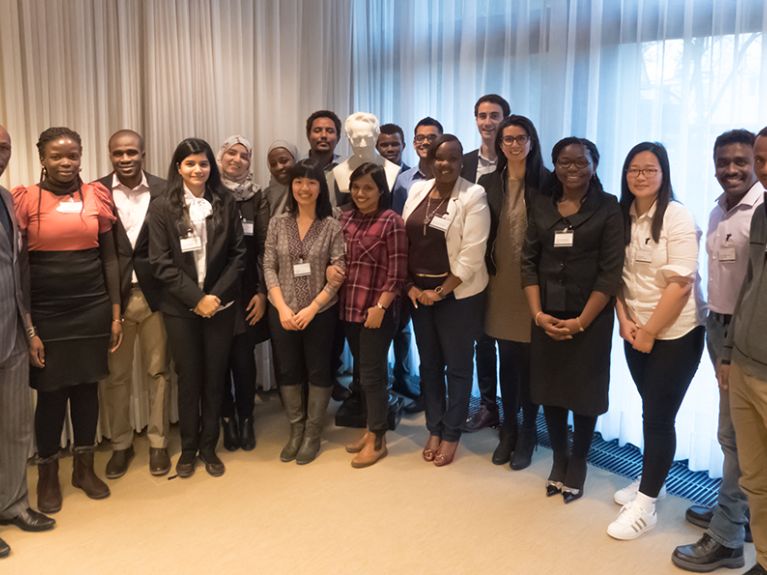Betty, Fati and the others
Never before have so many Africans received a climate protection scholarship as this year.

Since 2009, the Alexander von Humboldt Foundation has awarded climate protection scholarships to young scientists from emerging markets or developing countries outside Europe. Never before have so many Africans been among the recipients. Of the 19 scholarship holders in 2017-8, 11 are from Africa, five of them women. All of them can now spend a year working on a climate change research project of their choosing in Germany. They will be supervised by professors at German universities – whom they again choose in line with the focus of their research work.
Distress through drought

Betty Jepchirchir Rono, 29, is one of them. She holds an M.Sc. From Egerton University in Nakuru, Kenya, and now wants to complete a doctorate. In Germany, she has been conducting research for the last six months at the Helmholtz Centre for Environmental Research GmbH – UFZ on how to help farmers in her home country. As a result of climate change, farmers have increasingly to contend with rising temperatures and changing rainfall patterns. The consequences are droughts and the related death of cattle, crop failures, and starvation, as occurred once again at the beginning of this year. “Starvation is a terrible plight for a country to suffer,” says Betty Rono. While still in Kenya she therefore collected data on the droughts of the last 40 years. With the help of an ingenious software program, she is now devising a kind of drought monitor and a drought index that is intended to predict droughts accurately, enabling international assistance programmes to kick in early.
Early warning system for farmers
Furthermore, she has also conducted extensive interviews with more than 120 farmers in Kenya in order to understand how people respond when faced with drought and why they choose such a response. The Kenyan government has put an emergency programme in place to buy cattle during periods of drought. “However, the cattle are the most precious asset a family has, and it is highly unlikely to part with them,” explains Professor Aletta Bonn, Betty’s supervisor in Germany at the University of Leipzig who is busy supporting her research. Moreover, soil gets leached if too many cattle are kept on it. Betty combines the scientific collection of the abstract data on drought for forecasting purposes with sociological insights into traditional behavioural patterns. The result, she hopes, will be an early warning system that will even reach people in remote parts of the country via mobile phone.
A network for the future
People in East Africa are suffering from the consequences of extreme drought in 2017, too. About 12 million inhabitants risk dying of starvation, or so relief organizations warned months back. At the beginning of the year, Kenya’s government declared a state of emergency. Droughts have increased in recent years. Betty hopes that her research in Germany will enable her to help her home country. In Germany, alongside the good technical facilities the university offers, she also has the opportunity to forge contacts to many scientists, she explains. She believes this network will help lay the foundations for the future of Africa . The good thing about her Humboldt scholarship is, she says, that she can now rely on a lifelong network the world over. That opens up the borders in people’s minds. As part of their programme the young scientists not only get to meet energy corporations, organizations such as Greenpeace or United Nations agencies in Germany; they also regularly swap notes on things. “We’ve founded a WhatsApp group where we link up with one another at least three times a day, Betty comments.
Coastal dangers
For example with Fati Aziz, who comes from Benin and is busy at the Leibniz Institute for Baltic Sea Research in Warnemünde comparing how coastal regions in Germany and Ghana can be protected against the impact of climate change by means of sustainable measures. As early as 2010 the World Bank ascertained that parts of the Ghanaian coast, and with them thousands of kilometres of the West African coastline, are threatened with submersion in the medium term. The Atlantic is chewing away at the flat sandy coastal regions from Mauretania to Cameroon. In Ghana, almost all the country’s industrial base is in coastal regions. If the sea level rises, floods will threaten the population, because thousands of people have migrated to the coastal areas in search of work, serving the offshore oil and gas industry . To make way for new settlements, many mangroves have been cleared and yet it is their roots that previously held the sandy soil in place and prevented erosion. Forecasts suggest that the sea level is likely to rise owing to global warming by at least half a metre world-wide by the end of the century. A UN study says that many places along the coast of Ghana may be submerged in the process. In the comparative study Fati set outs to show how climate change will alter the coasts of Germany and Ghana.